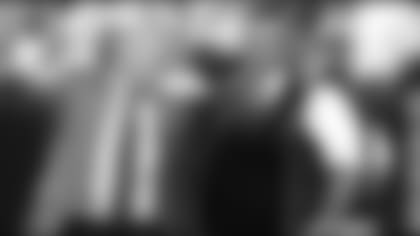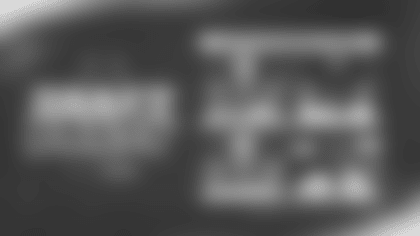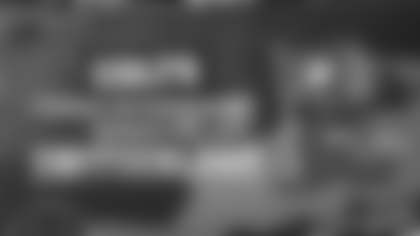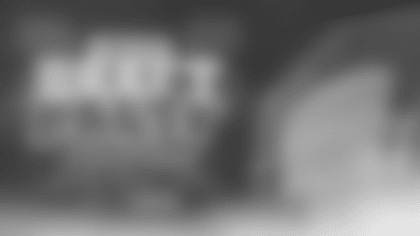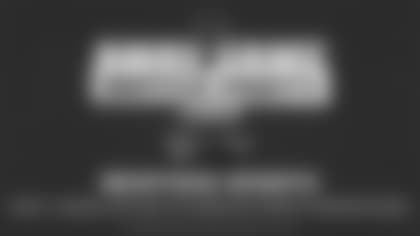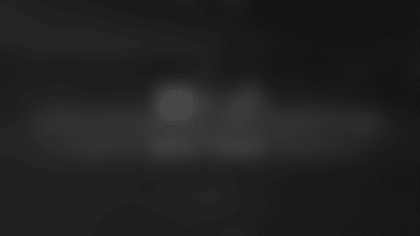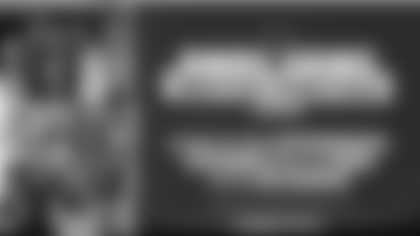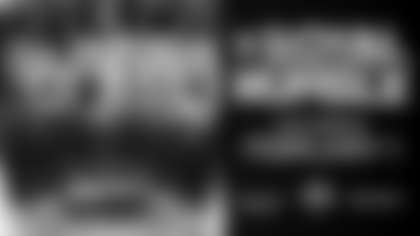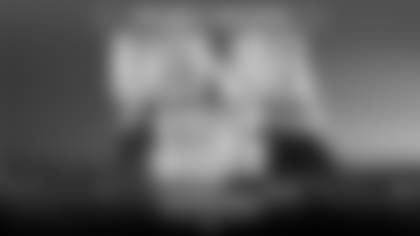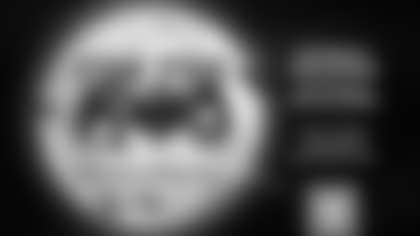Week 11: Colts at Chargers
Bill Polian, in his 11th season as Colts president, has a resume unique in the NFL. One of two men to win NFL Executive of the Year five times, Polian in the 1980s built the Buffalo Bills into a four-time Super Bowl participant. In the mid-1990s, he built the expansion Carolina Panthers into a team that made the NFC Championship Game in its second season, 1996. Since joining Indianapolis in 1998, he built the Colts from a 3-13 team in 1997 and 1998 into one that has made the playoffs eight of the last nine seasons, including an AFC Championship Game appearance after the 2003 and 2006 seasons, AFC South titles in 2003, 2004, 2005, 2006 and 2007 and a Super Bowl championship following the 2006 season. Each week during the season, in The Polian Corner, Polian and Colts.com will discuss issues pertinent to the Colts and the rest of the NFL.
Question: A 33-27 victory over the Houston Texans for the Colts on Sunday. When you reviewed the tape, what did you see? A tale of two halves?
A: Yes and no. It was sort of a tale of about a quarter and about a half. Then, in the second quarter – including the fits-and-start drive (by the Colts) that ended the half – we really picked it up and played exceptionally well. One of the nice things about Sunday was how (second-year offensive left tackle) Tony Ugoh fought through lots of bad breaks – and he got two very bad breaks on the penalties – and up against a really, really good rushman (Texans defensive end Mario Williams) – how he fought through the bad breaks and came back and played really good football. He has had two really good weeks – and (Colts offensive line coach) Howard (Mudd) confirmed this. The graph is up. The line on the graph is up. He's playing very, very well. To fight through that kind of adversity for a young player is really a good thing. I'm very happy for him and proud of the way he conducted himself.
Q: What happened on the play on which he was called for tripping?
A: He got run over by Mario Williams and in so doing, his body got knocked on the ground at an odd angle. His legs splayed out. Williams sort of tripped over the legs, but he (Ugoh) made no attempt to try to trip Williams. It was just happenstance. I could see why the official would call it. They're very conscious of leg whips and trips and things like that because they can be injurious. I could see why he would call it, but there was no intent on Tony's part to do anything at all. He just got blown up. I'm sure that will be fined, because they routinely do that, and then we'll have a chance to argue it on appeal. I'm equally sure they'll be relatively lenient on appeal because anybody who knows offensive line play knows he got blown up. That's what happened. The other (penalty), the holding penalty, was really not one we would hold Tony responsible for – let me put it that way.
Q: When you have a series like he did, how tough is it to come back from that?
A: It's very hard. Let's draw the analogy most of us can relate to. You're out there on a pitching mound – little league, high school or college or even professional baseball – and you give up a home run. It's a lonely feeling. Everybody in the park knows you gave up the home run, but now the next batter is up and he's not the guy who hit the home run. Someone else is going to take his cuts. It might be a .220 hitter that you can get out, in which case you put it behind you. In this case, you gave up a home run and the same guy is coming at you time and time and time again, so it's very difficult mentally to fight through that. Howard spends a lot of time with his offensive linemen emphasizing to move on to the next play and to not get hung up on the last one. 'Move on to the next play.' Tony (Dungy) emphasizes this constantly. When we make errors we don't repeat the play. Many, many people in football will repeat the play until they get it right. Tony (Dungy) believes there aren't any repeats in the ballgame and you have to learn to put the error behind you and correct it during film study and move on. That's what Tony (Ugoh) did. Great credit to Howard, and great credit to Tony for having the fortitude to do that, move on and play much, much better as the game went on.
Q: It was a bit of a slow start for the Colts Sunday. How much did the fact that so many players missed practice last week contribute to that?
A: I think Tony (Dungy) pointed to that. We had 15 players miss practice Wednesday, then of course (safety) Bob Sanders came up lame Friday, so we had to make a number of different switches there to accommodate that, including certain packages that we were going to play. It can cause sluggishness. It can cause indecision. Don't forget: when there are 15 players out, someone else is taking those reps. We didn't shorten practice any, so there might have been a little bit of fatigue, even, in that situation, or at least not as much bounce in your step as you might otherwise think you would have. We certainly got that corrected in the second half. We went out there and banged away and ran the ball successfully. Our offensive line got a great chance to line up and knock somebody off the football, which was good. We didn't have to contend with blitzes and things like that and when they did blitz, (quarterback) Peyton (Manning) picked it up and was able to take advantage of it. (Wide receiver) Marvin (Harrison) had a great day. All in all, a nice afternoon, but one that started a bit sluggish.
Q: Everyone wants to know what gets said by Tony at halftime to change a game like Sunday's. It's not as much what it is said sometimes as just guys figuring out what they have to do . . .
A: There are no magic formulas or speeches. That's myth in a lot of cases. What we did, really, was focus on what we had to do and what they were doing to us. We are a team that's very good at halftime adjustments, because what we have to do is simply focus on a few things. The design of our offense and defense is such that all we have to do is emphasize a few things and we can get things straightened out or we can become even more efficient. That's what we did. We focused on a few things – getting the run established, making sure we knew who to block when the blitzes showed up. If we did, we knew we were going to get some plays. That's what happened and we did OK.
Q: Can you comment on the status of Colts Head Coach Tony Dungy. Will he be back next season?
A: Tony will make his decision very soon after the end of the season whether or not he wants to come back. That's something he has done every year for the past three years. He'll talk it over with his family and decide whether he wants to give it one more year. If he does, we'll just move ahead as we always have. If he does not, then (Associate Head Coach) Jim Caldwell will step in as the head coach immediately and we'll move forward with a seamless transition.
Q: What happened with safety Bob Sanders last week? Why did he miss the game?
A: Bob had some swelling in his knee that developed on Friday after he had practiced on Thursday. His normal routine is to rest on Wednesday, practice Thursday and Friday and play Sunday. The swelling was such that he didn't feel like he could go. There has been consultation off and on all weekend between (Doctor) Jim Andrews down in Birmingham, Ala. – who operated on Bob back in the early fall – and our physicians. I'm not sure I can give you a definitive answer right now as to what specifically is wrong and what kind of a prognosis they can give other than they told me that none of the doctors believe there is anything structurally wrong. In other words, there is no ligament damage. There is nothing of that nature. They believe it to be some type of irritation inside the knee joint. That's a very vague and incomplete answer, because I don't know what the specific answer is at this point and I can't tell you what the prognosis is. The one thing I can definitely say is they've been in contact with Doctor Andrews and together, they'll try to develop some sort of regimen of treatment.
Q: Might he have to cut down practice time in order to play on Sunday?
A: It's conceivable, but it would be premature to jump to those conclusions. This has to be governed by the doctors and how they view the problem and what's causing it.
Q: What record do you think it will take for the Colts to make the playoffs and who might they play in the first round?
A: I wouldn't even hazard a guess as to tell you who our first opponent might be if we're fortunate enough to make it. I'll take that back. It's likely we will be a wild card, which would mean as the No. 5 seed you would play the fourth seed, whoever that might be. If you were the sixth seed, you would play the third seed. That much is known. Beyond that, I wouldn't hazard a guess. I think 11-5 will pretty much assure you of a spot. We have the tiebreaker on most of the teams we might be in contention with. Obviously, we don't play the Jets and we don't play Buffalo. It remains to be seen with San Diego. That's the last tiebreaker game we have on our schedule. Then, of course, we have games against Jacksonville and Tennessee remaining, which affect division record. That's also a tiebreaker, as is conference record, but I would think 11-5 would probably be pretty good. Tony seems to think so. The way the AFC is, anything less than that might be a little dicey.
Q: The Colts have usually played with a division lead in recent seasons, but to be involved in this tightly-contested conference race – this is the norm in the NFL, isn't it?
A: Yeah. Of course. This is the way it is every year in the National Football League. That's why I say: We have to continue to play each week – and I said this last week and I'll repeat it – we have to continue to play each week with focus only on the particular opponent that's coming up. Don't worry about next week or the week after that or the week after that. Don't worry about, 'This game looks winnable. This game doesn't look winnable.' All of that is for fans and pundits to ruminate upon and talk about, but the bottom line is that we have to only concentrate on our next opponent. It's very easy for us. That's the San Diego Chargers. If we keep doing that week to week, the results in the long run will take care of themselves. I learned a long time ago. 'Take care of the little things and the big things will take care of themselves.' If you take care of your job week to week, which is the next opponent, all the rest of it will fall into place.
Q: Can teams steal the audibles that Peyton calls at the line of scrimmage? How much of a concern is that?
A: Not much. We don't worry about it, and it isn't that big an issue. There are plenty of ways we can disguise what calls we make. I don't think that's an issue. We've heard week after week, 'This team has our audibles. That team has our audibles.' It doesn't seem to affect us very much. If we just go out and execute we'll be fine.
Q: How big was the drive at the end of the first half? A lot of crucial penalties were called on the Colts, but they still managed a field goal on the possession?
A: It gave us a shot in the arm. To overcome that kind of adversity, much of it self-inflicted, was pretty good. If you can do that, you go into the locker room at halftime with a really good feeling.
Q: Can you talk about the job kicker Adam Vinatieri has done this season?
A: It's terribly important. The placekicker wins football games for you. People always joke about it and there's a famous Alex Karras line about the kicker who said, 'I keek a touchdown,' but the bottom line is those guys win games for you. You ask them to perform at the most difficult times. Adam Vinatieri has done that for his entire career and we're very fortunate to have him. On top of that, he's a great kickoff man. His kickoffs have been outstanding this year, but you have to have that clutch field-goal kicker. If you don't, you find out that you lose many more games than you otherwise would because so many times it comes down to a clutch field goal at the end of a game. Most games in the National Football League are decided by seven points or less. More than 50 percent, so that guy's an awfully important person.
Q: When did you start the tradition of shaking every player's hand during warm-ups?
A: I haven't the vaguest idea. I did it at the outset, because I just wanted to let the players know that management was behind them and with them and not sitting up in the box in the sky judging everybody. Then, it became a superstition and a habit. Three or four years ago, I may have been speaking to the Commissioner or someone from the league office. The warm-ups start and Peyton hollered at me, 'Get out here.' So, I said, 'OK.' Being a superstitious person, just as he is, we went ahead with it. It has been just that – a superstition – since then, but I'm glad the guys like it.
Q: Any other superstitions on game day?
A: A few, but they should remain trade secrets.
Q: What will happen with Marvin Harrison after the season? Will the Colts have to make a decision on his future based on the salary cap?
A: I'll explain it in the context of any player. Not just Marvin Harrison. Because I think to talk about any specific player is both premature and off the mark. The discussions you have to have relative to the salary cap are discussions that relate to any individual. The bottom line is there is a salary cap. Every year we are required to be under it at the start of the season. The question is, 'How do you do that?' There are a couple of different ways to look at that. The first is you can simply say, 'Dollar for dollar, this player doesn't measure up and therefore we'll let him go.' That's one way to do it and oftentimes that's the decision you have to make. The other this is to say, 'Well, we only have so many dollars. We view this player's productivity as 'X' and he's getting paid 'Y.' Can we somehow redo his contract?' Again, I'm not speaking specifically about Marvin here and I don't want anybody to take this out of context and think that I am. This is purely a generic answer to what is a generic question. You would look at it from the perspective of, 'Can we rework the contract?' In many cases, we have done that and in the final analysis you try to get as much production and as many good players under the salary cap as you possibly can. I might add as well that at this stage of our development as a team we have lots and lots of highly-paid players because they are among the best at their position. Peyton Manning and Marvin Harrison are sure-fire Hall of Famers. If I'm right, they are the most productive duo of all-time. It's only a matter of time – I hope a long time – before they are on their way to Canton (the site of the Hall of Fame), but you look at that at the end of the season. That's the time you look at that. Even if you go to the Super Bowl, you still have a month from the Super Bowl until the start of the new league year, which is roughly March 1, to deal with and make those decisions. That's the time that we would do it. We do it every year. It's not fun. No one likes to part with players. We lost (guard) Jake Scott (to Tennessee) this past year largely because his agent gave us a demand at the outset that we didn't feel was appropriate. When the market didn't go where Jake's agent thought it was going to go, he was unwilling to bring him back here. That happens frequently. I'm glad for Jake he got a good contract and am not so happy to have played against him in Tennessee, but that's life. That's the way it goes. It's a difficult period of time, but one we deal with and wrestle with every year and with every player whose contract is coming to a close and some whose contracts are not. It's business as usual and we'll do that again this year. Every player has to meet that test. Not just Peyton Manning or Marvin Harrison or anyone else. We look at it in the context of each and every player.
Q: Can you comment on just how the Colts are put together, and who deserves the credit for acquiring personnel?
A: There are lots and lots of people who deserve accolades and credit for putting this team together – (Vice President of Football Operations) Chris Polian; (Director of Player Personnel) Tom Telesco; (Consultant to Player Personnel) Dom Anile; a great, great scouting staff, all of whom work like the devil to ensure we have the right kinds of players; and, of course, Tony and a great coaching staff, who develop those players; and (Colts Owner and Chief Executive Officer) Jim Irsay, who gives us the wherewithal and the support necessary to get it done. When we were building this team at the outset, we hired nine scouts and that was among the largest scouting staff in the National Football League. I know Jim Irsay took some heat from people saying, 'What are you doing hiring as many people as you are in the scouting department? That's wasteful. It's not necessary.' Now, we're one of the average-sized staffs in the National Football League, because we've proven that the way we planned it works. It was Jim who gave us that support and stood by us and allowed us to get it done. There is a lot of credit to go around for everybody.
Q: A far as the scouting staff, is it a situation where every scout has a certain area for which he's responsible?
A: Yes. Everybody has an area and they have roughly 25 schools in their areas. They're in each school four times a year during the regular season, then twice again during the summer and spring months, exclusive of Pro Days, where they really bounce all over the map trying to go into schools when players are working out in the spring. It's a tough job. Being an area scout is a tough job, but our guys do a great job of it. Actually, they'll be in right around the 12th of December, just before Christmas. They'll go through the (draft) board the first time and get it up in preliminary fashion. They'll come back in February, just prior to the (NFL Scouting) Combine. Then, they'll do another run-through after the bowl games and after they've had the opportunity to cross-check each other and heard the discussions that take place at the preliminary meetings. Then, they're back about 10 days before the draft just to put the finishing touches on it. But, really, from the time the season ends until we get to the draft day Tony and I are involved in it on a daily basis. I'm involved now of course in scouting, going to schools and watching players. Tony, and to a lesser degree the coaching staff, get involved in it in the offseason.
Q: How is illegal contact called during the first five yards of a pass route?
A: It's a constant thing, because contact in the first five yards is allowed so long as you don't basically haul the guy down by the face mask or horse collar him. You can put your hands on him in any way shape or form within the first five yards and it's perfectly legal. After the first five yards, you must take your hands off of him and that's liberally interpreted by the officials – how liberally depends on the officiating crew – but the first five yards are fair game, basically.
Q: On the long incompletion to Marvin in the end zone Sunday, did the officials rule that an uncatchable pass?
A: I don't think that the ball was uncatchable and I didn't see a signal. They're supposed to wave their hands over their head if the ball is uncatchable. I did not see such a signal. I could be wrong on that. We did question the play and we'll see what they have to say.
Q: Why is it not an intentional grounding penalty when a quarterback spikes the ball to stop the clock at the end of a half or game?
A: The reason it is not a penalty is because some years ago the (NFL) Competition Committee exempted it because we wanted to encourage the idea that you could stop the clock with a spike rather than somebody throwing an errant pass into the third row of the stands, which was the accepted procedure at the time in order to kill the clock. We said, 'Let's be realistic. Let's be functional and say that you can spike the ball and that will stop the clock.' The idea was we wanted to give the offense every opportunity to perform well and make games exciting and interesting, so we allowed the spike and that's the nature of it. It is an exception to the rule as written, but one that everyone acknowledges is good.
Q: The San Diego Chargers are the next opponent. They're 4-6, but they've had some close games and tough losses . . .
A: That's correct. They are a very, very good football team. They have talent that is rare. On the offensive side of the ball, (quarterback) Philip Rivers is the leading passer in the AFC, (running back) LaDainian Tomlinson is a Hall of Fame back. Darren Sproles can damage you many, many ways in the return game, as we well know from last year's game, and in the passing game, as we well know from last year's playoff game. They have really good receivers. Antonio Gates, of course, is their perennial Pro Bowl tight end, and they have (wide receiver Chris) Chambers who is now back and healthy. He'll make a big difference for them. Brandon Manumaleuna is a big, huge blocking tight end who has made the running game go over time. They have had lots of injuries on defense and they have had lots of difficulty on the defensive side of the ball. They removed their defensive coordinator, Ted Cottrell, after the game in London against New Orleans and replaced him with Ron Rivera, who probably because he is a Buddy Ryan disciple will bring a little more blitzing than Ted did. But they have an extremely talented defense. (Linebacker Shaun) Phillips is a terrific rusher. They miss (linebacker) Shawne Merriman, who is out for the season with a knee injury, but they have Luis Castillo, who is a terrific nose tackle and a great inside pass rusher, so this is a team that very easily could be and probably should be 7-3 except for a couple of bad calls and a bad bounce here and there. They're a very formidable opponent. You would much rather be playing them here, but we're not, so we have to go out to California and do our best. It's likely to be another high-scoring affair, because both offenses can really move the football and usually as it did last season out there it comes down to special teams in those kinds of situations. We've got to do a great job on special teams of limiting Sproles and stop him from hitting home runs in the kicking game, which he has every ability to do. It's a tall order. Most people, if you were a pundit before the season, you'd pencil in an 'L' next to our name in this particular game, but as (ESPN NFL announcer) Chris Berman is wont to say, 'That's why they play the games.' We'll go out there and give it our best shot. One thing I can guarantee is we'll be focused solely on the San Diego Chargers. Nothing else counts. Nothing else matters but that and we'll give it our best shot.


